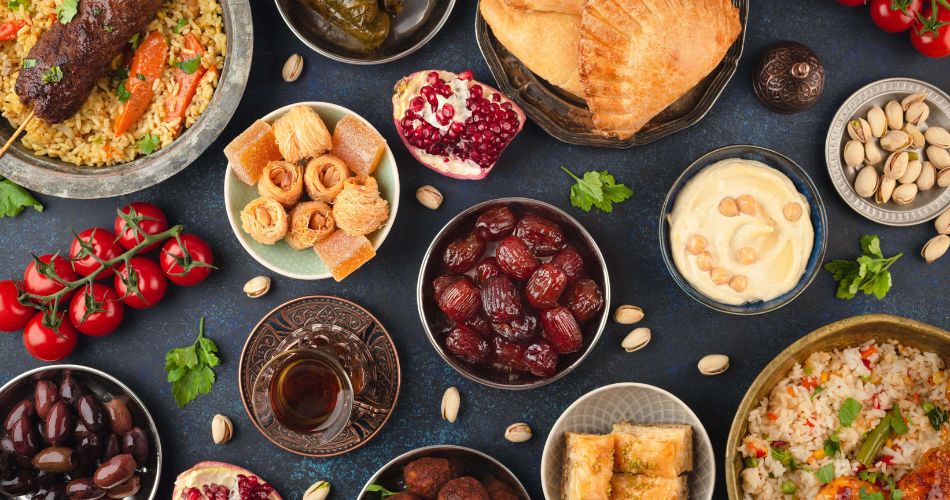We are in the Holy Month of Ramadan and the meal that all of us look forward to is the Iftar, which is laid out at an appointed time coinciding with the sunset (or ‘maghrib’, as it is known in the Islamic world). It marks the end of an exacting day-long fast and is served 12-13 hours after the first and only meal of the day (‘suroor’ or ‘sehri’), which the believers partake of just before the sunrise (‘fajr’) prayers.
Fasting during the Holy Month of Ramadan, which coincides with the time when the Quran was first revealed to the Prophet (Praise Be Unto Him) and culminates in Eid-al-Fitr (not to be confused with Eid-al-Adha, or ‘Bakra Eid’), is one of the Five Pillars of Islam. The month is meant to be spent on spiritual reflection, prayers and community bonding. The daily ritual of fasting and feasting is therefore very important for a Muslim.
The pre-dawn ‘sehri’ is loaded with food that sustains a believer through the day, which is why the protein-rich ‘paaya’ (or thick, gelatinous soup prepared with goat trotters) and ‘nihari’ (or meat stew) slow-cooked overnight have become the preferred dishes, and these are eaten with ‘khamiri roti’ or ‘sheermal’. This early meal is washed down with tea or warm milk and ends with either ‘kheer’ or ‘meethi sevian’ (or sweet vermicelli).
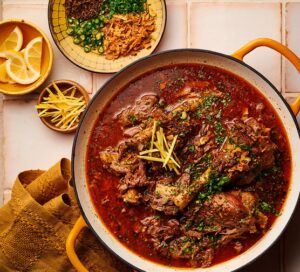
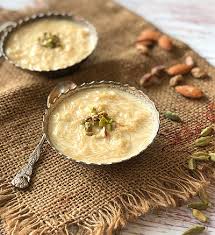
The Iftar, on the other hand, is a more balanced meal that helps the body to recover gradually from the complete denial of food and water through the day. People wonder why Muslims eat dates to break their fast. The tradition goes back to the Prophet (Praise Be Unto Him), who loved eating dates (one of the most nourishing gifts of nature in the vast Arabian desert) and would break his fast with dates.
Since then, the tradition (or Sunnah) has continued. Dates are in fact a great source of protein, B vitamins, fibre and potassium, all of which are important supports to the immune system and ensure that the body functions healthily. In the words of Muhammad ibn Isa al-Tirmidhi, an Islamic jurist and compiler of one of the six hadith (canons) of Sunni Islam: “When one of you breaks his fast, let him break it with dates for they are blessed. If they are not found, let him break it with water for it is pure.”
The idea also is to help the body transition into accepting a regular meal. The accumulated thirst because of the denial of water is addressed by ensuring that an Iftar meal starts with a refreshing lemonade or a freshly squeezed fruit juice. It is a soft start to what turns out to be a heavy meal.
An Iftar is meant to be shared with the poor and the needy, or with friends, which makes it quite a treat even for non-Muslims. It is common for Muslim families to throw Iftar parties, where the spread ranges from ‘pakodas’ and ‘samosa’ to ‘seekh kababs’, chicken ‘tikkas’, ‘kormas’ and ‘qaliyas’, with ‘shahi tukda’, ‘kheer’ and ‘seviyan’ providing the sweet send-off.
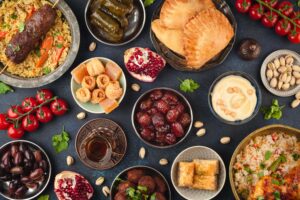
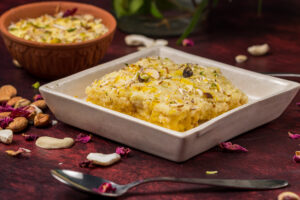
You can plan your big Iftar party with We The Chefs, whether you are hosting it at your home or, better still, at the We The Chefs Experiential Centre in Gurugram, Haryana. Look out next for our Guide to Hosting the Ultimate Iftar Party with We The Chefs.
Call 8800988490 or drop an email at order@wethechefs.in to book your Iftar party
It is also the time to visit the Muslim-dominated parts of your city, such as Jama Masjid and Shaheen Bagh in Delhi. Restaurants places come alive with a constant flow of guests digging into their favourite Ramazan dishes. It is an occasion for all, irrespective of their religious beliefs, to celebrate with faith and fervour.
If in Delhi it means a visit to the neighbourhood of Jama Masjid for a gastronomic journey from Kallu Nihari (the shop has inverted the serving time for ‘nihari’, but people don’t really care!) to Al Jawahar, to Aslam’s Chicken, which each dish is in equal measure an umami and cholesterol bomb, laden as it comes with a Patiala Peg-equivalent of butter.
It could also be the time for a discovery of the gustatory joys on offer at Shaheen Bagh/Okhla (‘chapli kabab’, for starters, and then a meal at Shaan-e-Karahi, perhaps the only restaurant in the city serving food inspired by Pakistan) and Nizamuddin, where the Ghalib Kabab Corner serves mutton ‘seekh’ and ‘boti’ kababs that have seen a steady surge in their popularity.
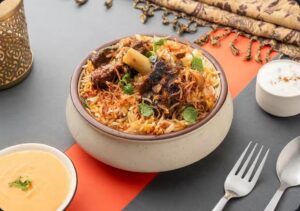
And for lovers of biryani, this is the time to pay a visit to the Delhi outlet (in Rajouri Garden) of Kolkata’s legendary Arsalan, or to the Kolkata Biryani House at Chittaranjan Park, from where you can order, apart from a Kolkata Biryani, an authentic Chicken Rezala or a Chicken Bhorta. Whether you are eating in, or eating out, this is the time for celebratory evenings.
Wish to host an Iftar party at home? Click here to prepare a menu of your choice, book our Z’Appetite Party Packs by 11 A.M., and get us to home deliver your party.

